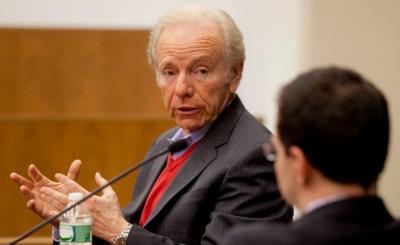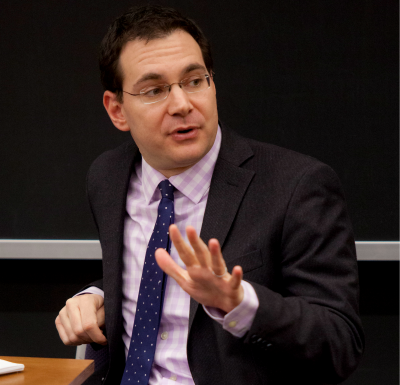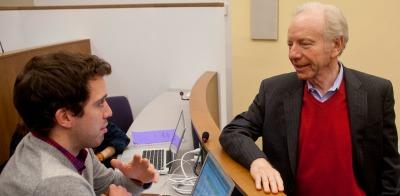Yes, That J. Lieberman
Former Senator Joseph Lieberman Co-Teaches a National Security Law Seminar on Congressional Power with Professor Matthew C. Waxman.
New York, March 14, 2014—In a recent class on the role of Congress in U.S. foreign and defense policy, Columbia Law School Professor Matthew C. Waxman pointed to a 1991 resolution authorizing the use of force in Iraq as an example of the influence the legislative branch has in decisions about war.
The resolution was a good case study for students in and of itself. But something else made the discussion even more relevant and exciting. Waxman’s co-instructor for the seminar is the sponsor of the 1991 resolution in the Senate, former Sen. Joseph I. Lieberman.
President George H.W. Bush “knew the country would be in better shape if he could get Congressional authorization,” Lieberman recalled during the class. “The president also rounded up votes in the U.N. Security Council so he could say to Congress, ‘you’re not out there alone.’ There was a collaboration between executive authority and Congressional action.”
| Sen. Joseph I. Lieberman and Professor Matthew C. Waxman leading a recent class. |
Waxman and Lieberman make a good teaching team: Waxman has held senior positions at the U.S. Department of State, Department of Defense, and National Security Council; Lieberman was a U.S. senator for more than two decades until he retired at the end of 2013, serving most recently as chairman of the Homeland Security and Governmental Affairs Committee and a senior member of the Armed Services Committee. Together, they offer Columbia Law School students a rare behind-the-scenes look at the relationship between the executive and legislative branches of the U.S. government.
The course they created and teach jointly each week, Congress in American Foreign and Defense Policy, covers everything from the recent crisis in Ukraine; decisions about military force in Iraq, Kosovo, Libya, and Syria; management of wars in Bosnia and elsewhere; economic sanctions; foreign aid; counterterrorism; failed cyber security legislation; and intelligence oversight. The seminar is just one of many national security law courses offered through the Roger Hertog Program on Law and National Security, which Waxman co-chairs. The Hertog Program is unique in that its offers students the chance to learn from full-time faculty, lecturers, and fellows who are current or former senior level government attorneys who have worked on national security issues.
“In legal education, there’s a lot of emphasis on presidential powers and the role of the courts, but not very much emphasis on the role of Congress,” Waxman said. “This course fills that gap.”
Lieberman, who joined Kasowitz, Benson, Torres & Friedman as senior counsel after he left the Senate, agreed.
“Our course uses real life case studies that show how Congress carries out its constitutional responsibilities to declare war and allocate funds and also inserts itself to be more proactive in the formulation of foreign and defense policies,” he said.
The goal is to teach students how Congress operates and negotiates power but also to illustrate the legislative process more generally for aspiring public policy lawyers or future firm attorneys who may represent private clients in interactions with government.
“No matter what kind of career students pursue, it’s important to have a good understanding of how legislative politics and processes work,” Waxman said.
| Professor Waxman |
For students, the chance to learn from two veteran insiders was too good to pass up. The seminar was one of the most sought-after offerings for the 2014 spring semester, with a lengthy wait-list. The final course roster included so many students, visitors, and guest speakers that the class had to be moved to a larger room in Jerome Greene Hall after the first few weeks.
“I always look for seminars Professor Waxman teaches,” said Matthew B. Danzer ’15, president of the Law School’s National Security Law Society. “When I saw he was teaching a class with someone with the last name Lieberman and first initial ‘J,’ I thought, ‘there is no way this is who I’m thinking of.’ Then I saw Sen. Lieberman’s photo in the online course guide.”
Danzer said the combination of Waxman and Lieberman at the head of the class is incredible.
“There really is tremendous value in having the perspective of someone in Congress to help us understand that it’s not just about the actions of the executive; it’s about the interplay of Congress and the executive and the judiciary,” he said. “Having all of that in one room is really terrific.”
To ensure the room is filled with practical insight each week, Waxman and Lieberman have made a concentrated effort to invite guests who can offer their own perspective on the examples being studied. Recent visitors include U.S. Navy Captain William J. Parker III, a military fellow at the Council on Foreign Relations and former senior military adviser to the Secretary of State for Iraq Affairs; and H. Jefferson Powell, the Samuel Rubin Visiting Professor of Law and a former deputy assistant attorney general in the Office of Legal Counsel at the U.S. Department of Justice.
| Sen. Lieberman talking with students before a recent class. |
The result is an academic environment second-to-none, with students, guests, and professors actively participating in discussions about current and historical events and learning from each other’s experiences.
Lieberman said he feels right at home in the classroom, and he is certainly welcome there.
“When he speaks everyone listens,” Danzer said. “He was in the Senate before some of us were born.”


